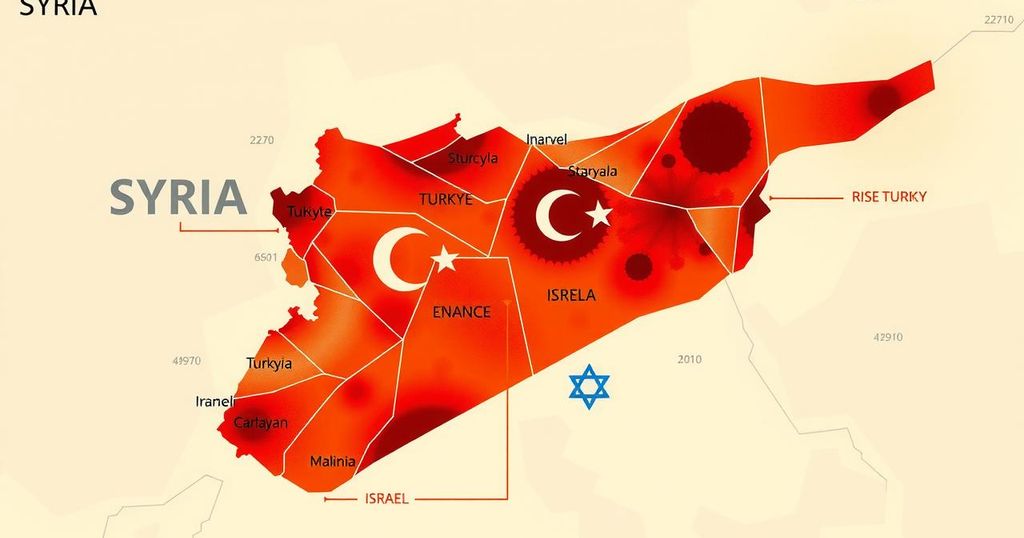Syria’s Future Post-Assad: Competing Visions of Turkiye and Israel
The removal of Syrian President Bashar al-Assad marks a significant shift in regional dynamics, with Turkiye and Israel vying to assert their influence. Turkiye is focused on preventing Kurdish autonomy, escalating military operations in northern Syria, while Israel targets Iranian positions. The new Syrian administration faces the challenge of balancing relationships with both nations to navigate an uncertain future.
The ousting of President Bashar al-Assad on December 8, 2024, signifies a pivotal moment in Syria’s history, introducing a new era characterized by complex regional dynamics. As Turkiye and Israel assert their influence, conflicting agendas are redefining Syria’s future and affecting the broader stability of the Middle East. The transformation in the balance of power is anticipated to have lasting repercussions.
Since the commencement of the Syrian civil war in 2011, Turkiye has significantly impacted the conflict’s trajectory. Initially, Ankara allied itself with various armed groups opposing al-Assad, such as Hayat Tahrir al-Sham (HTS). However, as the war evolved, Turkiye’s focus shifted towards preventing the establishment of a Kurdish entity near its border, which it perceives as a critical security threat.
To bolster its security, Turkiye has intensified military operations in northern Syria, specifically targeting Kurdish forces. The Turkish-backed Syrian National Army (SNA) launched a significant offensive in December 2024, capturing over 200 square kilometers from the Syrian Democratic Forces (SDF). Turkish airstrikes have also been a prominent feature, resulting in over 150 targeted operations against SDF positions within a few months.
Turkiye has deployed more than 10,000 troops along its border with Syria while establishing multiple military outposts. These measures aim to foster a permanent military presence and facilitate demographic changes by resettling pro-Turkish Syrian Arab families in strategic areas. Ankara has also invested approximately $2 billion in infrastructure projects, reinforcing its control of northern Syria.
Contrastingly, Israel’s strategic focus is to prevent Iran and its ally, Hezbollah, from regaining influence in Syria. Following al-Assad’s ousting, Israel escalated its military operations, conducting airstrikes targeting Iranian positions and Iranian-backed forces. Reports indicate at least 80 airstrikes conducted between December and March, aimed at disrupting Iranian logistical networks.
The current administration under President Ahmed al-Sharaa faces the challenge of navigating relationships with both Turkiye and Israel, each with contrasting interests in Syria’s future. While discussions are underway regarding Turkish military presence, Syria is simultaneously attempting to assert greater sovereignty and engage pragmatically with surrounding powers to foster stability.
Al-Sharaa’s government has adopted a more pragmatic stance toward Israel compared to its predecessor, prioritizing internal stability over regional confrontations. Although formal diplomatic relations remain absent, backchannel communications facilitated by international mediators indicate a cautious engagement between the two nations.
Despite their lack of direct military conflict, Turkiye and Israel exhibit growing tensions due to their opposing interests in Syria. Turkiye’s support for certain opposition factions is perceived by Israel as a security threat, complicating interactions further. Intelligence operations from both parties continue to intensify, reflecting their mutual surveillance and espionage efforts.
Syria stands at a crossroads, with external influences exerting an intricate pressure in the wake of al-Assad’s removal. Nations like the United States, Iran, and Russia maintain significant roles within Syria, introducing additional layers of complexity. Countries such as Saudi Arabia and the UAE have shifted toward engagement with Syria, supplying economic support while attempting to balance their regional interests against Turkiye and Iran.
The future of Syria remains uncertain, hinging on the new administration’s capacity to navigate the intricate web of internal challenges and external pressures. Their success in establishing stability will largely depend on their ability to foster relationships amid the evolving geopolitical landscape of the region.
In summary, Syria’s future is shaped by the growing influences of Turkiye and Israel, as they pursue conflicting agendas following the ousting of President al-Assad. Turkiye’s military operations focus on countering Kurdish autonomy, while Israel seeks to diminish Iranian influence within the region. The new administration’s challenge lies in effectively managing these external pressures while ensuring internal stability and governance. The outcome will be pivotal in determining Syria’s trajectory towards peace and prosperity.
Original Source: shafaq.com




Post Comment